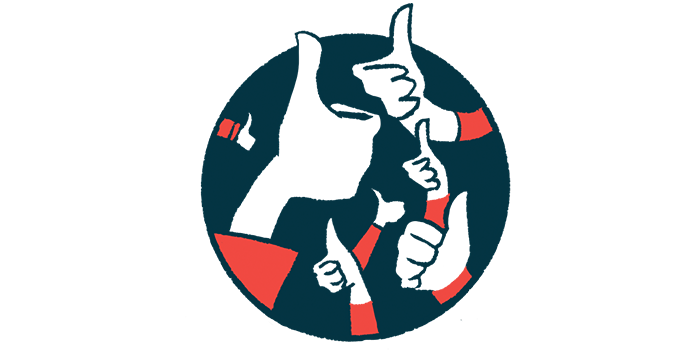European Committee Favors Uplizna’s Approval for Certain Adults With NMOSD
Written by |

A committee of the European Medicines Agency has recommended approving Uplizna (inebilizumab-cdon) for adults with neuromyelitis optica spectrum disorder (NMOSD) who test positive for aquaporin-4 water channel autoantibodies (AQP4-IgG).
This recommendation from the Committee for Medicinal Products for Human Use, known as CHMP, will now be reviewed by the European Commission. The potential approval for Uplizna, developed by Horizon Therapeutics, will cover all EU member states, as well as Iceland, Liechtenstein, and Norway.
“In Europe, people living with NMOSD currently have very limited targeted treatment options and we look forward to advancing care for these patients who live daily with unpredictable attacks, pain and disability,” Tim Walbert, the company’s chairman, president, and CEO, said in a press release.
“Today’s positive CHMP opinion is a significant milestone in Horizon’s global growth and long-term commitment to address critical needs of those living with rare, autoimmune and severe inflammatory diseases,” Walbert said.
NMOSD is an autoimmune disease in which the immune system wrongly produces antibodies that attack astrocytes and oligodendrocytes — cells that support the nervous system — and cause inflammation in the optic nerve and spinal cord.
Uplizna is designed to reduce the risk of NMOSD attacks by binding to B-cells and eliminating them, thereby reducing autoantibody production.
The therapy was approved in the U.S. for people with AQP4-IgG autoantibodies in June 2020. In Japan, it was approved earlier this year for preventing relapses in all NMOSD adults, with or without AQP4-IgG antibodies.
The approvals and CHMP’s recommendation were based on positive results from the N-MOmentum trial (NCT02200770), which demonstrated that Uplizna reduced the risk of relapses in individuals with AQP4-IgG-positive NMOSD by 77%, compared with a placebo.
N-MOmentum involved 230 adults with a history of at least one attack requiring medication one year prior to enrollment, or two attacks in the two years before screening.
Participants were randomly assigned to receive either 300 mg of Uplizna (174 patients) or a placebo (56 patients) on days 1 and 15, and were followed for about six months after the second dose. After this period, all patients had the option to enter an open-label extension part to continue receiving 300 mg of Uplizna every six months.
In addition to showing reduced relapse rates, the results demonstrated that Uplizna reduced pain and significantly lowered the proportion of participants who experienced a worsening on their Expanded Disability Status Scale (EDSS) score over this first six months (15.5% vs. 33.9%).
Of note, an analysis of patients who received Uplizna for four or more years in N-MOmentum and the open-label extension demonstrated that the benefits were long-lasting, with 83% of participants being attack-free since starting on this treatment.
The relapses occurred mostly in the first year of treatment. Beyond one year, 92% were relapse-free during follow-up. In comparison, these patients had a mean of 1.8 attacks per year in the two years before starting Uplizna.
“NMOSD is a very devastating and serious condition where symptoms become worse over time and are followed by periods of less severe symptoms that do not completely cease, so my patients never know what to expect,” said Friedemann Paul, MD, a researcher in Germany who was involved in the trial.
“During a relapse, damage to the optic nerves and/or spinal cord can lead to accumulating disability, therefore, preventing attacks is critical to a good long-term outcome,” said Paul, head of the neuroimmunology outpatient clinic at the Experimental and Clinical Research Centre.
Paul said the CHMP’s positive recommendation for Uplizna has brought “such hope” to patients with the progressive disease.
“There continues to be a high need for new treatments, specifically developed for NMOSD, that can help to ease symptoms and prevent future relapses,” he said.
Uplizna has been granted orphan drug designation in Europe, which is expected to accelerate the therapy’s development and availability, through benefits such as market exclusivity and exemption from application fees.





